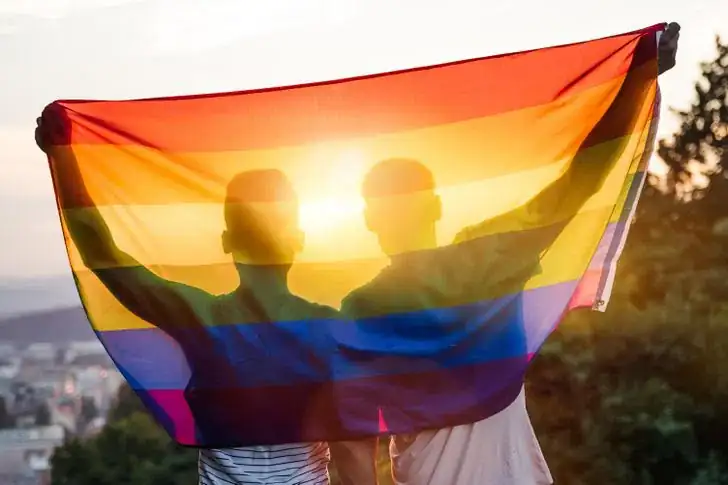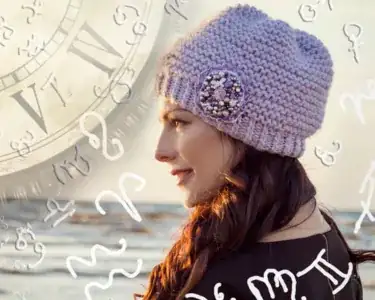Am I Bisexual?
If you have ever wondered “Am I bisexual?”, you’re not alone—and you’ve come to the right place. Bisexuality means romantic or sexual attraction to more than one gender, and there’s no exact set of criteria or experiences you have to check off to identify that way.
If you’re looking to explore your attractions, we’ve got the quiz for you. Ready to get some answers?

Questions Overview
- I’d be thrilled.
- I’d be nervous. My stomach would probably do a little flip.
- I’d be curious about getting to know them better.
- I’d be flattered, but I’d let them know I’m not interested.
- I see myself with someone who identifies as the same gender as me.
- I could see myself with a partner of any gender, including non-binary or gender-expansive people.
- I’d be happy with a man or a woman.
- I see myself with someone who identifies as the opposite gender.
- I’m an expert on everything from queer ships to gay slang.
- I probably know about more queer content and influencers than most people.
- I’d say I have average knowledge.
- I’m not super up-to-date on gay pop culture.
- Yes, definitely. But I also fantasize about people of a different gender.
- Maybe, but hasn’t everybody?
- Once or twice.
- No.
- Yes, and I’d do it again.
- Yes, and that’s why I’m taking this quiz.
- No, but I wonder if I’d be into it.
- I don’t think I’d like it, or I tried it and didn’t like it.
- Yes, I definitely had a crush on my same-gender best friend.
- Yes, I think I can crush on people regardless of gender.
- Maybe, I’m not sure if that was a crush or not.
- No, I don’t think so.
- Yeah, people pretty much just assume that.
- My parents or close friends have asked about it.
- No one’s ever asked me that, but I wouldn’t be shocked if they did ask.
- Nope. People assume I’m straight.
- For sure, but I also get butterflies around people of the opposite sex.
- Only with one specific person or when I look at a really attractive celebrity.
- I’ve felt a little nervous, but that’s probably just normal.
- No. Don’t think so.
- I’m pretty sure I’m bisexual.
- I don’t think I’m straight, but I’m not sure what I am.
- I’m taking this just for fun!
- I think I’m straight but just checking.
- Labels can be helpful.
- I personally don’t like using labels, but I know other people like them.
- Labels are confusing and/or unnecessary.
- I’ve never really thought about it before.
- As long as I’m with someone I really like, that sounds great.
- Good, I guess?
- I can’t imagine that and I don’t think I’ll ever want that, regardless of gender.
- I’m too young for that.
- Yes, I probably questioned my sexuality more than other people.
- Sometimes, and I can’t explain why.
- Maybe, but that could just be from my personality or upbringing.
- No, I don't think my experience with crushes is super different.
More Quizzes
ABCs of Sexual Orientation and Gender Identity
What do the letters in LGBTQ+ stand for? These terms don’t have universal definitions since everyone who identifies with a certain label gets to pick what that identity means to them. After all, it’s hard to define a key part of someone’s experience in a single word! But to give you the basics of LGBTQ+ terms, we’ve put together a glossary of common terms you might see or hear.
Asexual (“ace”) - Asexual refers to a lack of interest in sex or sexual contact with other people. People who use this umbrella term might experience a range of sexual attraction, from zero desire for sex, to occasional sexual attraction, or attraction only alongside a strong emotional bond (demisexuality).
Bisexual (“bi”) - The term bisexual refers to attraction to people of the same gender and another gender.
Gay - While this adjective has historically described men who are attracted to other men, the term now is used to refer to anyone who experiences romantic, emotional, or physical attraction to people of the same gender.
Gender identity - Gender identity is an internal feeling of how individuals perceive themselves as male, female, genderqueer, non-binary, etc.
Gender expression - Gender expression is the external way people convey their gender identity through behavior and physical appearance like clothing choices, body characteristics, speech patterns, etc.
Intersex - Intersex people are born with anatomy or sex characteristics that don’t fit into the “male” or “female” binary boxes. They may or may not identify with the sex they are assigned at birth (just like non-intersex people).
Lesbian - Women and non-binary people use this term to identify as people who are emotionally, romantically, or sexually attracted to other women.
Pansexual (“pan”) - Pansexual refers to people who are attracted to any/all genders or who don’t limit their attraction to the confines of the gender binary. Some pansexual folks might say that gender and sex are not determining factors in their attraction.
Non-binary - Non-binary refers to gender identity rather than sexual orientation. People who identify as non-binary express their gender and identity in a way that lives outside of and inherently rejects the socially-constructed gender binary. This term can include people who are genderqueer or gender expansive too.
Queer - This is an umbrella term that includes a variety of gender & sexual identities that fall outside of heteronormativity and the limitations of gender binary systems. While the word queer was once a slur, many people in the LGBTQ+ community have reclaimed the term to be radical and all inclusive.
Questioning - Questioning is both a noun and a verb. It describes periods of personal reflection and exploration involved in the process of discovering sexuality, gender identity, and gender expression. Additionally, it can be the second Q to queer in LGBTQQ, to denote the inclusion of folks questioning their identities.
Sexual orientation - Sexual orientation describes a person’s inherent physical, emotional, or romantic attraction towards other people, often based on their gender identity and/or expression. It is often used interchangeably with attraction and sexual identity.
Transgender (“trans” or “trans*”) - Transgender is an umbrella term that includes people whose gender identity and/or gender expression transgress the boundaries of gender and can differ from the sex they were assigned at birth. Since gender identity and sexual orientation are separate, transgender people can identify as straight, gay, lesbian, bisexual, etc. The spelling trans* is sometimes used to include all gender-queer or expansive identities.
Want to learn more?
There are hundreds of important terms related to sexuality, gender expression, gender identity, and the LGBTQ+ community. For more info, here’s what we recommend:




















